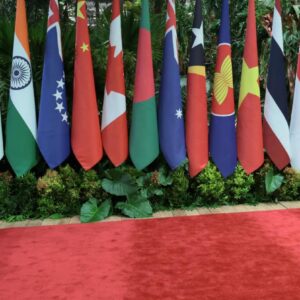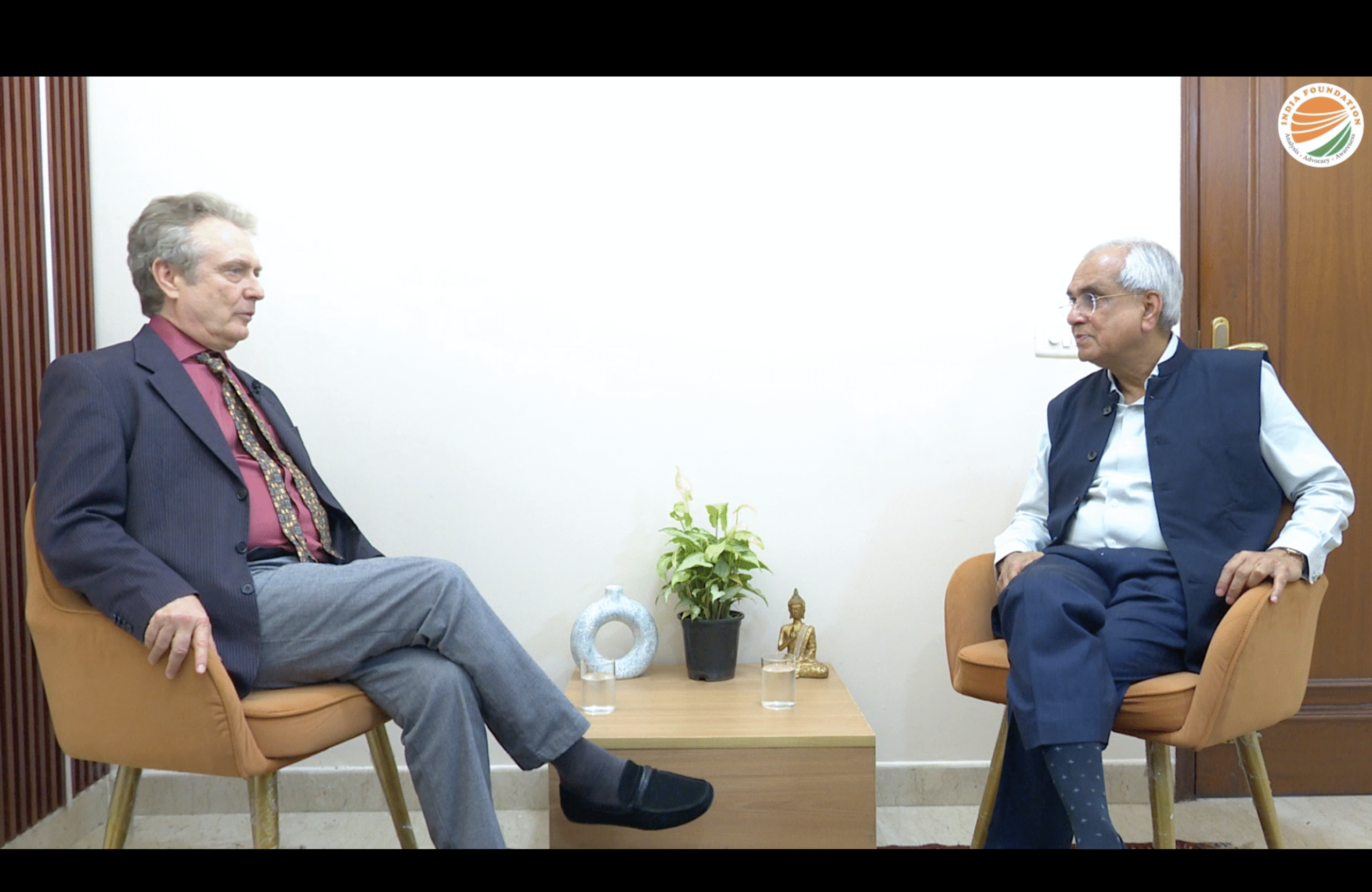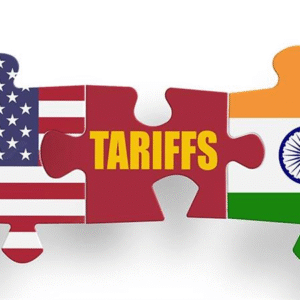On 22 February, 1994 a unanimous resolution was passed in both Houses of the Indian Parliament which reiterated and emphasized that the whole of Jammu and Kashmir is unquestionably an integral part of India. The only outstanding issue between India and Pakistan therefore is the return of the regions occupied illegally by Pakistan since the year 1948, to India. In order to keep this alive in national memory, Centre for Security and Strategy (CSS), in collaboration with the Jammu-Kashmir Study Centre has initiated a series of Conferences on the issues central to Pakistan occupied Jammu and Kashmir (PoJK). This year, the Conference was held in the Jammu Club in Jammu, on 22 February, 2013, marking the date on which the resolution was passed in the Indian Parliament.
The Keynote address was given by Shri. P.C. Dogra, Former Director General of Police, Punjab followed by an address by Prof. K. Warikoo, the Director of the Central Asian Studies Programme in the School of International Studies of JNU.
Shri. P.C. Dogra’s opened his keynote address with the mention of the bomb blasts that took place the previous evening in the southern city of Hyderabad. He highlighted how even after many repeated attacks such as these, India still seems to come off as a nation without a will strong enough to counter or stop such instances from happening again and again. The attack on the Indian Parliament in December 2001 and the attack in Mumbai in November 2008 in addition to all other such events of terror are all, according to him, to be seen as severe attacks to weaken the Nation. Just to counterbalance for the sake of votes, he said, India seems to give a political colour to terrorists, thereby not showing enough political will to seriously curtail further such events. He read out an excerpt of a letter from Sardar Vallabhai Patel to Jawaharlal Nehru in 1950, in which the former had warned Nehru of the threat that the Chinese pose in light of the “disappearance of Tibet as we know it”, with China expanding its borders. The significance of this, he said is seen in today’s PoJK situation, with China playing an active role in empowering Pakistan with its support, as well as having designs of its own as regards the occupation of the Northern Areas.
Therefore he stressed that “we have not been listening to our leaders”. He further emphasised that only by being aware of such forewarnings of the current situation, can the security of India be safeguarded without compromise. India being a wide and vast nation will become hard to keep safe, otherwise, he concluded.
Professor K. Warikoo spoke on the geo-strategic importance of Pakistan occupied Jammu and Kashmir. He disagreed with the claim that the Frontier Area did not belong to India. He claimed that these areas are inherently a part of Indian history since the Kanishka and Kushana times and this is very much supported by physical evidences as found in sculptures, artwork and other building architecture as found in these areas itself. With the support of slides of pictures that were taken during his visit to Gilgit and Baltistan, late last year he showed evidence of the same. In addition, he stated that till the 1950s, the area was still directly under Indian administration for the purposes of trade.
In the following session, Shri. JL Kaul, President of Jammu-Kashmir Study Centre addressed the audience on the present situation of Jammu Kashmir. He gave a brief background to the atrocities that are being committed on the people living there- the near suspension of human and political rights to the people living in these regions and the very desperate economic and social situation that seems to be the everyday reality there. He claimed that while most of population in these areas is Shia. Earlier it was more than 90% Shia in population, however now, with a pro-Sunni Pakistan having all operative control of the administration, one sees maybe even less than 50% of the population remains Shia, today.
Captain Alok Bansal, a Senior Research Fellow at Centre for Land and Warfare Studies (CLAWS) later took stage to talk about the human rights violations that are taking place in the Gilgit-Baltistan area. He stressed on how the power does not seem to lie with the many councils that were created and ordinances passed by the Pakistani Government. He stated that the actual power as regards these areas lies in the hands of a council called the ‘Kashmir (Gilgit-Blatistan) Council’. More than half of the members of this council are nominated from Islamabad, he said.
In light of the above claims he showed a couple of pictures that highlighted the intensity of protests that are taking place against the Pakistani administration, even as latest as 18th February, 2013. It only reflects the sentiments of the people and the larger conscience of the civil society in Gilgit-Baltistan, he stated. If India was to follow up on the political resolution passed on the 22nd of February 1994, it will serve in the interest of Indian political powers that be to understand the aspirations and the psyche, of the people of these areas, he said. To this effect, Captain Bansal split the problems of Gilgit-Baltistan into quick pointers for easy reference and understanding of the audience. To summarise the same, the problems faced there are as below—
Absence of political rights of the people.
Most of the decisions that are taken usually seem to come straight from Islamabad. Even the judiciary for Giglt-Baltistan is appointed from Pakistan.
Ethnic marginalization.
In 1998, the population of these regions was about 8 lakh-odd.Today the population of these regions stands at 14 lakh-odd. A rise of 40% population in just 14 years indicates large illegal migration into these areas. this migration primarily occurs from the neighbouring Khyber-Phaktunwa province. Because of this, a demographic change is taking place, leading to ethnic marginalization. The rich local cultures and practices are getting wiped out with the extent of migration into the existing population. For instance, in Giglit which is the centre of all trade and markets, he states that Pathans and Pashtuns have gained control. The sectarian violence that is taking place in Giglit-Baltistan is essentially a part of the sectarian violence that is taking place in Pakistan.
Lack of representation in Governance
The main sources of employment in the G-B area are in tourism or from recruitment into the Gilgit-Scouts. Even in this is a marked decrease in the number of native people employed. For instance, the Gilgit-Scouts has gone from having only natives in its ranks, to having less than 50% of its members from the regions of Gilgit-Blatistan. This is leading to a lot of discontent amongst the people of these areas.
Economic exploitation
He states that this region, being not only rich with rivers, is also rich in minerals and gems. The construction of the Karakoram Highway facilitates billions of dollars worth of trade that takes place in these regions, but the profits of this do not serve these regions. One can see the lack of development and infrastructure here. In addition to this, even the establishment of a University here seems to be incomplete: the staff is never fully present. This helps the flourishing of Madarsas and other religious institutions in bits and pieces all over the region.
This by extension has led to the erasure of pre-Islamic languages and cultures. He provides the example of Burushaski, a language that is spoken almost exclusively in these areas, but is slowly disappearing. Stating the very same unanimous resolution that was passed in February 1994 in the Parliament of India, many people from these regions demand for reservations in the highest educational institutions of India.
The next most important point that Captain Bansal provided is that of the influence of China in the Gilgit-Baltistan areas. China has started planning inroads in addition to the already existing pipelines. As of today, China has around 32- 36 projects that are operating in Gilgit-Baltistan. In this sense, Captain Bansal concluded that the Government of India, needs to act in such a way as to assure the people here that they will be given support from the Government of India, whose Parliamentary resolutions plan to claim these territories back as their own.
Next, with Dr. Narender Singh came a group of migrants and refugees from various parts of Pakistan occupied Jammu and Kashmir. Each had a story of strife to contribute, to make the audience understand the situation in these areas better. Some of them had firsthand experience of the events that had taken place as the Pakistan administration started taking over their areas, and some others had issues of displacement and the effect on their family and familial dynamics to share with the audience.

One of the key issues that the audience could take away from this particular session was that of the issues that the migrants had faced in the form of ‘registration’ that was done with their and other migrant families in order to enroll them for state benefits. Some claim that hardly any compassion was shown to people who were separated from their families. Many such people were turned away from being registered, as the rules apparently needed the head of the family to be present with any person who wanted to be registered as a ‘migrant’. The other rules were that, if any person whose income was above Rs. 3000 at the time of displacement, they were not to be registered. If they are displaced and have lost their jobs, how is this 3000 rupee income, also something that they have now lost, going to help in being a qualifier in order to be registered for benefits, they ask. Another flaw that was pointed out was that the Government had set a stipulated period for taking migration into account. This period was from 1947-1957. After this, no one who came or wanted to come into India was treated as a migrant, nor was s/he registered as one.
A few other speakers claimed that since they were not put under the category of ‘migrant’, they do not have any access to basic amenities. Another issue is that the Indian Government did not even question the construction of the Mangala Dam. This was constructed on the lands of many Hindus and Sikh refugees. A lot of the refugee families are only just coming to terms with fact that their lands or homes are almost inaccessible to them today. With no formal registration as refugees till today, these families are neither here, nor there. They state that there are almost 39 existing refugee camps, to this day in these Northern Areas, and hence wonder if this isn’t a human rights violation. For the last so many decades, people have been living in refugee camps with nowhere to go; why is this not taken up as a human rights issue in various international forums they ask.
In the next session, Captain Alok Bansal’s book was released. This book shows the relationship between Gilgit-Baltistan and India through a historical context, dismissing the theories from the Pakistan administration that say otherwise. He spoke briefly about legends like Maharaja Lalitaditya, and even the Emperors Akbar and Jahangir who have always had relationships with Gilgit-Baltistan. The economic exploitation of these regions today and the sectarian and ethnic marginalization of the people here are also explored in this book.
Sajjad Hussain Kargili, a social activist and freelance journalist, started off his address to the audience by passionately wondering whether to condemn Pakistan for the atrocities that their administration has been committing in the G-B areas, or whether to blame the India Government for the indifference that they have so conveniently shown towards the same. He said it is regrettable that while Indian civil society in India is aware of the 200 billion dollars spent in Afghanistan, for what cause and the names of influential leaders in Afghanistan, they are not aware of the situation and the aspirations of the people of Gilgit-Baltistan. The Indian administration has not acted in any way whatsoever so as to claim these places as belonging to India. He said, while the Indian political society seems to readily speak out against the atrocities committed in Palestine, or in any other part of the world, they are silent when everyday such atrocities take place in Gilgit-Baltistan by either the Pakistan administration, or by the Taliban, or the fact that a common man does not even have the power to vote in these areas. He mentioned that even commercial flights cannot be operated in these regions, and that for more than 6 months in a year, the region remains almost cut-off from the rest of the country. It seems sad that the Government of India does not seem to be interested in understanding the demographic and the complications in these Northern Regions, he exclaimed.
As Mr. G Parthasarathy, Former High Commissioner of India to Pakistan took stage he stressed that the strife that is going on in the GB area is not limited to these Northern regions, and took the example of the killings of Hazaras in Quetta. He stressed that the complexion of the population in the Northern regions is fast changing thanks to Pakistani designs, just as China is doing in Xinjiang and in Tibet. He also stated that the Indian Government, while in talks with Pakistan never seems to take up these issues into discussion. He highlighted that it seems ridiculous that the Indian administration does not seem to be courageous enough to take up an issue that is so clearly elaborated via a unanimous resolution of the Indian Parliament. While outfits like Lashkar-e-Tayyaba seem to openly declare the fact that their aim is to weaken India and subsequently make it an Islamic nation, the Indian Government does not seem to have a befitting reply to threats that go so openly against the non-exclusivist and secular credentials of this country. The developments in Afghanistan are definitely related to and will have an influence on the security situation in India.
The other problem he highlighted was that of the Chinese one. He said that according to the New York Times, 12-17 thousand of Chinese forces have been deployed in the Giglit-Baltistan area. He also brought the audience’s attention to the fact that there are highways and inroads being constructed by the Chinese, especially from Lhasa to Central Asia- The Western Highway. He spoke about at least 4,000 square kilometers of land that was given to the Chinese on lease by Pakistan: India has not claimed this territory and the Chinese have explicitly said, according to him, that there can be talks as regards this leased out territory only after the already-existing disputes between Pakistan and India are sorted, as this by way of dispute, belongs to Pakistan. However, he said that this meant that all this means that China will only extend this all the way to Gilgit and Chinese influence will only spread, as it has already started doing so with the numerous projects that are already put in the pipeline by the Chinese. Their aim is to make rail-lines till Wadar-Kot. He believes that there is no doubt that soon in the coming years, the Chinese navy will be given bunker facilities in these regions.
In his speech he narrated that in 2003, when China’s then PM went to Pakistan, an understanding was arrived at between the two countries. Elaborating on this, he says that right after that Pervez Musharraf gave a speech in the Pakistan Institute of Strategic Studies after which he called upon the Navy Chief and said to him, that if there is a war with India, it will not just be the Navy of Pakistan, but also that of China. He highlighted that this increasing friendship between China and Pakistan should worry India. Most nuclear facilities that are prevalent in Pakistan actually belong to China, he said.
China’s military engineers, he brought to the audience’s notice, are making tunnels in the regions of Gilgit-Blatistan. This has undercurrents not only as regards their desire to spread their influence into these territories, but is a cause of security concern in case of war-situations as missiles and high intensity explosives can be deployed via these tunnels.
Mr. Parthsarathy said that the historical context in which the resolution of 22 February, 1994 was passed is important: the Indian economy was in a major slump and so were our foreign exchange reserves. The Hurriyat and the Separatists had the support of agencies from the USA and the Clinton Government. Therefore the fact that this a resolution was passed at such a turbulent time is something that one must remember today. Only after the year 1994, he highlighted, did all terrorist organizations like Jaish-e-Mohammad or Laskhar-e-Tayyaba, start gaining foothold in India. Therefore, he concluded the situation in the northern areas is fast deteriorating. However, if the Indian administration keeps its own house happy first, and encourages economic growth, with patience and perseverance, he concluded that India will be able to tackle not just China or Pakistan individually, but also if the two countries do join forces.
This was followed by questions to Shri. Parthasarathy, in addition to the discussions and comments. These largely focused on the lack of political will in India to act on issues as regards the illegal occupation of these territories by Pakistan.
(Prepared by a Research Associate at the India Foundation)






